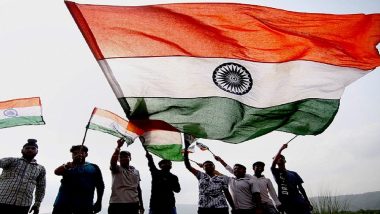With the 70th Republic Day being round the corner, our focus should shift back to the sacred document which integrates this diverse nation: the Constitution of India. Drafted under the chairmanship of India's tallest Dalit icon, Dr BR Ambedkar, the Constitution offers each citizens the Fundamental Rights which is essential to safeguard his or her interests against both - the state and the non-state actors.
Apart from the Fundamental Rights, the Constitution also dictates before us the Fundamental Duties -- a list of moral obligations which each resident of India is asked to abide by. The key difference between the two is that the latter is a set of recommendations, whereas, the former can be legally enforced. Know The Importance of Republic Day Celebrations.
On Republic Day 2019, Revisit the Fundamental Rights Accorded to Indian Citizens:
The Rights are listed in the Constitution between Articles 12-35. Academics broadly classify them into the six categories, as listed below:
- Right to Equality: Article 14-18
Equality before law: This states that all citizens are equal before law and are equally protected by the laws of the State. Also, this states that no person is above the law of the country.
(ii) No Discrimination on the basis of Religion, Race, Caste, Sex or Place of Birth
(iii) Equality of Opportunity to all Citizens in matter of Public Employment
(iv) Abolition of Untouchability: It was made a punishable offence by the constitution makers of the country.
(v) Abolition of Titles: Titles awarded by the British like Sir and Madam were abolished by the constitution of India.
- Right to Freedom : Article 19-22
Under Article 19 of the Constitution, six major rights of freedom are listed. This includes the freedom of speech and expression -- considered as the jugular vein of a democracy.
(a) Freedom of speech and expression (b) Freedom to assemble peacefully and without arms (c) Freedom to form Associations and Unions (d) Freedom to move freely throughout the territory of India (e) Freedom to reside and settle in any part of India (f) Freedom to practice any profession or to carry on any occupation, trade or business.
Article 19(2), however, imposes rightful restraints on the above listed freedoms, in order to ensure that the rights are not abused to harass, defame, or tarnish an individual, group or community. Below are the restrictions listed in section 2 of the Article:
Nothing in sub clause (a) of clause ( 1 ) shall affect the operation of any existing law, or prevent the State from making any law, in so far as such law imposes reasonable restrictions on the exercise of the right conferred by the said sub clause in the interests of the sovereignty and integrity of India, the security of the State, friendly relations with foreign States, public order, decency or morality or in relation to contempt of court, defamation or incitement to an offence.
- Right to Freedom of Religion : Article 25-28
The three articles stress on the freedom to practice and propagate any religion of one's choice. Here's what they state:
(a) Freedom of conscience and free profession, practice and propagation of religion.
(b) Freedom to manage religious affairs : Under this provision, every religion has the right to (i) establish and maintain institutions for religious and charitable purposes, (ii) manage its own affairs in matters of religion, (iii) own and acquire movable and immovable property and (iv) administer such property in accordance with law.
(c) Freedom as to the payment of taxes for promotion of any particular religion.
(d)Freedom as to attendance at religious instruction or religious worship in certain educational institutions.
- Cultural and Educational Rights : Article 29-30
The two Articles list down provisions aimed at protecting the cultural and educational rights of religious and linguistic minorities. Here's what they state:
(i) Protection of interests of minorities: Minorities having a distinct language, culture or practices have the right to conserve their culture. No citizen shall be denied admission into any educational institution maintained by the State or receiving aid out of State funds on grounds only of religion, race, caste, language or any of them.
(ii) Right of minorities to establish and administer educational institutions: Under this law, minorities have the right to establish and administer their own educational institutions.
- Right to Constitutional Remedies : Article 32-35
The most important aspect of the Fundamental Rights is the Right to Constitutional Remedies, as they ensure that all other Rights, as listed above, could be legally enforced. The Articles 32-35 also make sure that the State acts against itself if it has violated any of the Fundamental Right.
Apart from the six broad categories of Rights as mentioned above, recent additions have been made through legislative and judicial orders. In 2002, the Right to Education (Article 21A) was added to the Constitution by the Parliament. In 2017, the Supreme Court declared Right to Privacy as an absolute Fundamental Right under Article 21.
List of Fundamental Duties:
Article 51(a) of the Constitution of India enlists the Fundamental Duties that cast upon the citizens a moral obligation to:
- To abide by the Constitution and respect its ideas and institutions, the National Flag and the National Anthem;
- To cherish and follow the noble ideals which inspired our national struggle for freedom;
- To uphold and protect the sovereignty, unity and integrity of India;
- To defend the country and render national service when called upon to do so;
- To promote harmony and spirit of common brotherhood among all the people of India, transcending religious, linguistic, regional or sectional diversities, to renounce practices derogatory to the dignity of women;
- To value and preserve the rich heritage of our composite culture;
- To protect and improve the natural environment including forests, lakes, river, and wildlife and to have compassion for living creatures;
- To develop the scientific temper, humanism and spirit of inquiry and reform;
- To safeguard public property and to abjure violence;
- To strive towards excellence in all spheres of individual and collective activities so that the nation constantly rises to higher levels of endeavor and achievement;
- To provide opportunities for education to his child or, as the case may be, ward between age of 6 and 14 years.
Although an array of allegations are levelled against the State of violating or depriving the citizens of their Fundamental Rights, the question of abiding by the Fundamental Duties is inadequately raised. In the words of the late former US President John F Kennedy, "Ask not what your country can do for you, ask what you can do for your country."
(The above story first appeared on LatestLY on Jan 25, 2019 03:21 PM IST. For more news and updates on politics, world, sports, entertainment and lifestyle, log on to our website latestly.com).













 Quickly
Quickly


